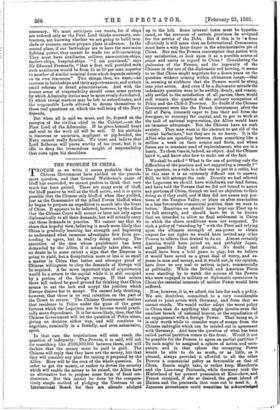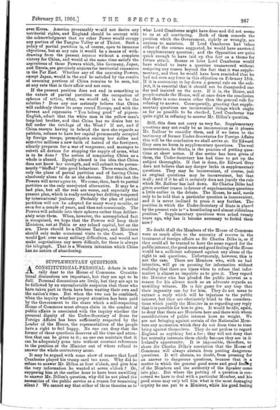THE PROBLEM IN CHINA.
T0VGH as we write it seems probable that the Chinese Government have yielded on the punish- ment question, and that General Waldersee's game of bluff has succeeded, we cannot profess to think that very much has been gained. There are many sorts of bluff, the bluff passive as well as the bluff active, and it is quite possible that the Chinese only bluffed when they yielded, just as the Commander of the Allied Forces bluffed when he began to prepare an expedition to march into the heart of China. It appears to be believed, however, by the Allies that the Chinese Court will sooner or later not only agree diplomatically to all their demands, but will actually carry out those demands in practice. We cannot say that we share this hopeful view, believing it much more likely that China is gradually learning her strength and beginning to understand what immense advantages flow from pre- tending to agree, but in reality doing nothing. The execution of the men whose punishment has been demanded by the Allies, if it actually takes place, will no doubt be to some extent a sign that the Empress is going to yield, but a decapitation more or less is so small a matter in China that better and stronger proof of Chinese willingness to obey the demands of Europe will be required. A far more important sign of acquiescence would be a return to the capital while it is still occupied by a portion of the foreign troops. If that occurs there will indeed be good ground for thinking that China means to eat the leek and accept the position which Europe desires her to accept. We cannot help thinking, however, that there is no real intention on the part of the Court to return. The Chinese Government realises that residence in Pekin under the guns of the great fortress which the Legations are to become would practi- cally mean dependence. It is far more likely, then, that the Chinese Government will let the question of Pekin alone, giving no decision either way, and will continue to negotiate, nominally in a friendly, and even submissive, spirit.
In that case the negotiations will soon reach the question of indemnity. The Powers, it is said, will ask for something like £100,000,000 between them, and will declare that the money must be paid in gold. The Chinese will reply that they have not the money, but that they will consider any plan for raising it proposed by the Allies. Here will be the crux of the whole question. In order to get the money, or rather to devise the security which will enable the money to be raised, the Allies have no alternative but to propose some form of fiscal con- dominium. But this cannot be done by the compara- tively simple method of pledging the Customs to an International Boar& for they are already pledged up to the hilt. Some internal taxes must be hypothe- cated, or the revenues of certain provinces be assigned for the service of the Debt. But if this is to 1 e done effectively it will mean that an International Commission must have a very large finger in the administrative pie of China. But can the Powers contemplate that notion with any satisfaction, or look upon it as a possible source of peace and amity in regard to China ? Considering the jealousies of the Powers, and the ingenuity of the Chinese in the use of the diplomatic red herring, it seems to us that China might negotiate for a dozen years on the question without coming within ultimatum range —that is, seeming so stubborn that the Powers would be stuns, into joint action. And even if by a diplomatic miracle the indemnity question were to be swiftly, firmly, and reason- ably settled to the satisfaction of all parties, there would still remain the question of the military occupation of Pekin and the Chih-li Province. No doubt if the Chinese Government were like the French Government after the fall of Paris, intensely eager to free their soil from the foreigner, to reoccupy the capital, and to get to work at the task of national regeneration, the Allies would have an immense advantage. But the Chinese have no such anxiety. They may want in the abstract to get rid of the "outer barbarians," but they are in no hurry. It is the Allies who are spending between them something like a million a week on their armies and fleets, and whose forces are in constant need of replenishment, who are in a hurry. To them time is, indeed, an object. And the Chinese know it, and know also how to make use of the fact.
We shall be asked" What is the use of putting only the difficulties of the position and not suggesting a remedy ?" The question, as a rule, is a fair one to put to a critic, but in this case it is an extremely difficult one to answer. Still, we will attempt the task. Directly we had relieved the Legations we should have withdrawn our land forces, and have told the Powers that we did not intend to annex any portions of China, though we had no objection to their doing so if they could, and if they did not annex any por- tions of the Yangtse Valley, or place us after annexation in a less favourable commercial position than we were in before. Meantime we should have kept our Fleet up to its full strength, and should have let it be known that we intended to allow no final settlement in China in which the above conditions were not respected. To such a policy of "standing by" with the Fleet and relying upon the ultimate strength of sea-power to obtain respect for our rights we would have invited any other Powers to adhere that desired to do so. Almost certainly America would have joined us, and probably Japan, and possibly Italy and Austria. No doubt. that would have been a bold game to play. but we believe it would have saved us a great deal of worry, and ex- pense in men and money, and it would not, in our opinion, have done us any real or serious injury, commercially or politically. While the British and American Fleets were standing by to watch the actions of the Powers who were engaged in military or diplomatic operations in China the essential interests of neither Power would have suffered.
Now, however, it is, we admit, too late for such a policy. We are, doubtless, committed to a very considerable extent to joint action with Germany, and from that we cannot recede. We would rather adopt the worst policy in China than do anything that might involve even the smallest breach of national honour, or the repudiation of an engagement with a foreign Power. That being so, it is only worth while to consider ways of escape from the Chinese imbroglio which can be carried out in agreement with Germany. And here the question of what has been called partial partition comes to the front. Would it not be possible for the Powers to agree on partial partition ? To each might be assigned a. sphere of action and occu- pation, and in that sphere the occupying Power would be able to do as much, or as little, as it pleased, always provided it afforded to all the other Powers a commercial policy as favourable as that of China. Russia might take, or rather keep, Manchuria and the Liao-tung Peninsula, while Germany took the Hinterland of her present possession at Kiao-chow, and France occupied, if she so desired, the great island of Hainan and. the peninsula that runs out to meet it. A Japanese protectorate could meantime be acknowledged over Korea. America presumably would not desire any territorial rights, and England should be content with the acknowledgment that no other Power would occupy any portion of the Yangtse Valley or of Thibet. Such a policy of partial partition is, of course, open to immense objections, but at any rate it would be a means of with- drawing from the present impasse without a complete victory for China, and would at the same time satisfy the aspirations of those Powers which, like Germany, Japan, and anemia, are genuinely anxious for territorial expansion in the Far East. Whether any of the annexing Powers, 'except Japan, would in the end be satisfied by the results of annexing portions of China remains to be seen, but at any rate that is their affair and not ours.
If the present position (Ries not end in something in the nature of partial partition or the occupation of spheres of action, what, we would ask, is to be the solution ? Does any- one seriously believe that China ivill-suddenly throw its arms round Europe, and with the -fervent and expressive "You belong good" of pigeon- -English, -admit that the white man is the yellow man's long-lost brother, and that China has no desire but to fall under the tutelage of the West ? if not, and if .China resents having to behead the men she regards as patriots, refuses to have her capital permanently occupied by foreign troops, 'promulgates among her sullen and ,eecretive millions a new faith of hatred of the foreigner, silently prepares for a war of vengeance, and manages to outwit all devices for stopping the supply of arms, what is to be done ? The notion of conquering China as a whole is absurd. Equally absurd is the idea, that China 'does not know her strength, and will submit to be perma- nently -" bluffed" into good: behaviour,- There remain, then, only the plans of partial partition and of leaving China -absolutely alone to do as she chooses. But this last the -Powers will neveraaree to. We come, then, back to partial partition as the only unrejected alternatives It may be a bad plan, but all the-rest are worse and especially the present plan, which is really nothing but drifting tempered by-international-jealousy. Probably the planof partial partition will not -be- adopted 4-or many weary months, or even .fora couple of years, and then not consciously. The Powers will subside into their spheres rather than deliber- ately seize them. When, however, the accomplished fact is recognised, we hope that the Powers will keep their Ministers, not at Pekin or any inland capital, but on the Oa. There, should be a Chinese Tangier, and Ministers should only make occasional visits to the Court. That would jget. over many military difficulties, and would not _mike negotiations any more difficult, for there is always the telegraph. That is a.Western invention which China _hianet.notiou of abandoning.







































 Previous page
Previous page